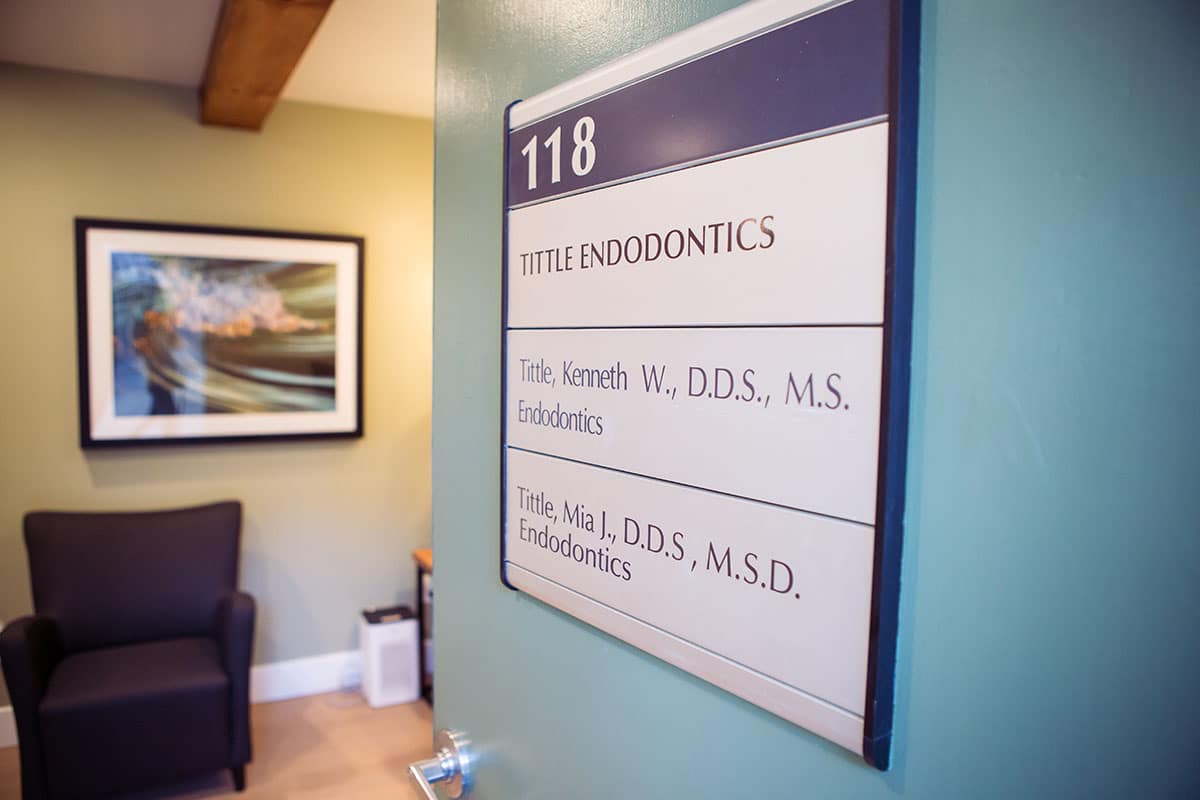Treatment Instructions

The experience of having root canal treatment at our office is very similar to other routine dental procedures. Here are some suggestions to help you prepare for your visit:
- Take your normal daily medications
- Eat a normal meal before your visit
- Bring your referral slip and radiographs if you have them
- Bring a list of your medications
- Wear casual, comfortable clothes
Many people enjoy listening to music during the procedure. We are happy to provide you with ear buds to use during your appointment, or you may prefer to bring your own.
Plan on being at our office approximately 2 hours. The vast majority of treatments are done with local anesthetics (numbing), so you can drive to and from our office unless special arrangements have been made to take sedative medications.
You may eat and drink as soon as the numbness wears off. Once you begin to eat and drink, avoid chewing or biting on the treated area until your permanent restoration is in place. The area may be more sensitive due to swelling. The temporary filling is a soft composite that is vulnerable to fracturing (cracking) with hard substances such as peanuts, pretzels, hard candy, ice cubes, etc.
You will need to see your regular dentist within a month to have a permanent restoration placed. Waiting longer than a month increases the chance that the temporary will fracture and/or decay will develop.
We recommend taking 600mg Ibuprofen (Advil®, Motrin®) every 6 hours for the first 2 days following treatment for discomfort and to alleviate swelling. If you are allergic to Ibuprofen, Tylenol® may be used. Do not exceed the guidelines printed on the label for any medication. If you are unable to achieve adequate pain relief, please call our office.
You may find using an ice pack to the affected area helpful. Please do not apply ice directly to the skin; have a cloth between the ice and skin at all times. You may apply the ice for up to 20 minutes on and 20 minutes off for the next 6-8 hours as needed.
Please keep the treated area clean by gently brushing the area and flossing regularly.
It is rare for a temporary filling to fall out although it may become dished out or compressed while in use. If the temporary falls out or feels differently after some time, please contact your regular dentist as soon as possible.
Some discomfort following the root canal is normal for several days after the treatment. In some cases, the tooth and surrounding tissue may be sore for a few weeks following the treatment.
THIS SECTION IS VERY IMPORTANT, PLEASE READ CAREFULLY
While flare-ups are rare, they occur about 5% of the time and cause significant pain. They occur with teeth that are extremely irritated and/or infected or with teeth that have a history of prior treatment. These sometimes occur randomly, even on patients that have had root canals done in the past without problems. If you have a flare-up you may experience moderate to severe pain, swelling, throbbing or general discomfort; please contact our office. You may be prescribed additional medication, such as antibiotics and pain management medication, and/or you may be asked to come to the office for further treatment. Should you experience any of these symptoms, please contact the office, even after hours.
- Eating soft foods such as yogurt, eggs, cereal, oatmeal, etc. to give your joints a rest. Avoid hard, crunchy foods (raw vegetables, chips, nuts), chewy foods (hard rolls, bagels, gum), and large foods that force you to open your mouth wide (hamburgers, big sandwiches, hot dogs, etc.).
- If the pain is acute (less than a few days), start with Ice. Massage the painful area with ice for 5-10 minutes. Remove ice for 5 minutes and repeat.
- If the pain is more chronic (more than a few days), use moist heat and ice therapy –Apply moist heat to tense muscles for 10 minutes, then lightly brush the painful area with an ice cube. Rewarm the area for 1-2 minutes. Repeat this ice and heat combination 4-5 times. You can make your own heating pack by wetting a washcloth or towel and microwaving it.
- Take Medications – Try over-the-counter medications such as Non-Steroidal Anti-Inflammatory medications like Ibuprofen or Naproxen as directed.
- Avoid yawning widely, resting your chin on your hand, resting the phone on your shoulder, or excessive talking. Try to practice good posture.
- Be aware of clenching and grinding – Try to keep your lips together and teeth apart. If necessary, set an alarm for every ten to fifteen minutes and check to make sure you are not clenching or grinding. This will become a habit.
- Try to avoid situations which are known to cause you to feel stressed or emotionally traumatized, since this can exacerbate symptoms (many people clench or grind their teeth when under stress). Some people go through stressful situations prior to developing TMJ disorder, but there is definitely a physiological factor involved as well. This point has been debated by patients and physicians for many years. Some patients do not believe that emotional factors play a large part in their disorder, while others do. More research needs to be completed regarding this issue.
- Proper Sleep & Diet. You would be surprised how much proper sleep and diet helps with pain. Depriving your body of much needed sleep can have negative effects.


